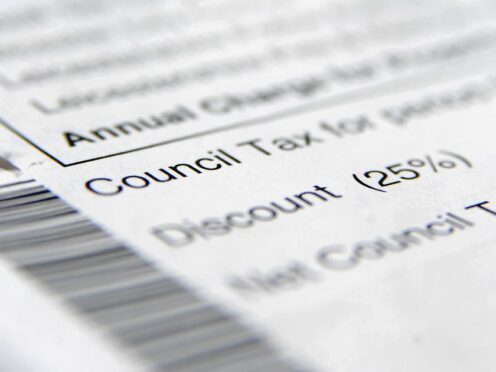
Scotland’s political parties are being urged to commit to scrapping the council tax after the 2026 Holyrood elections.
A report by the think tank, Our Scottish Future, has said before that election there should be efforts made to “build a cross-party consensus” on a new system of local taxation.
This could then be introduced sometime after the 2026 election, it suggested.
The think tank made the recommendation in a report which also called for councils to be given the power to join together and form Scottish Combined Authorities – thereby allowing authorities to collaborate and pool resources.
As the paper was published, Our Scottish Future chairman, Professor Jim Gallacher, said: “It’s time for Holyrood to stop telling our local leaders how to manage their business.”
He said the think tank’s Rewiring Scotland report had found there is a “clear consensus that more power should be held not in Edinburgh, but closer to our cities, towns, and communities”.
It complained that “increasing centralisation” meant there is a “lack of autonomy for local government”, with councils “often relegated to the role of a delivery agent for the centre rather than a genuinely empowered level of government”.
One of the main drivers for this is councils’ lack of financial autonomy, the report added, saying that “for years Scottish local government has been the least fiscally empowered in the whole of Europe, with the lowest level of local income-raising fiscal powers”.
🚨 NEW: Today Our Scottish Future launches our new report, "Rewiring Scotland" which sets out the case for the Scottish government to devolve more powers to our cities and regions to boost Scotland's stagnating levels of growth
— Our Scottish Future (@scottish_future) February 13, 2024
To change this, Our Scottish Future, which was set up by former prime minister Gordon Brown, demanded councils be given greater financial discretion, with the think tank calling on the Scottish Government to give multi-year budgets to councils to “allow them to plan properly”.
At the same time, it said ring-fencing of funds – where they are designated for a specific purpose by central government – must be “radically reduced”.
The report said: “Restrictive budget settlements and a lack of revenue raising power means that today, Scottish local government is in a dire financial situation.”
This has “greatly impeded” councils’ ability to “deliver for people at a time of growing demand”, it added.
With council tax being one of the few ways local authorities can raise money, the report argued the Scottish Government’s decision to freeze this for 2024-25 is “depriving councils of a vital income stream at a time of straitened finances, while doing nothing to reform an inherently regressive tax”.
With a call for council tax to be replaced with a “more progressive form of local taxation”, the report suggested a form of property tax could be used to ensure that “communities benefit from rising land values”.
Prof Gallagher, a former senior adviser to the UK Government on devolution, insisted that for the economy “to get growing again, Scotland needs change from central control”.
He told how the “devolution deals” set out in the report would allow for new combined authorities, made up of groups of local councils, which could “take control from Edinburgh on key economic decisions for their region”.

Powers over transport, planning, economic development and skills could be transferred to these Scottish Combined Authorities, the report, said, with Prof Gallagher adding the new bodies could be led “perhaps” by directly-elected provosts.
He added: “Scotland is one of the most centralised nations in Europe. More power in local hands would reinvigorate local democracy and tip the balance of power away from centralised rule and back in favour of our cities and towns.
“Just as Scotland doesn’t want Westminster to tell Holyrood what to do, so it’s time for Holyrood to stop telling our local leaders how to manage their business. Maybe then, the Scottish Government could do its own job better too.”
A Scottish Government spokesperson said: “The Scottish Government recognises the crucial role councils play in their communities, which is why their overall share of the 2024-25 Scottish Budget has been increased despite the profoundly challenging financial situation we face.
“The Scottish Government is making available record funding of more than £14 billion to councils in 2024-25 – a real-terms increase of 4.3% compared with the previous year if the council tax freeze is accepted.
“We committed to empowering Scotland’s regions in the programme for government, with Glasgow City Region’s ambitions to create a metropolitan region and Edinburgh’s regional economic prosperity framework highlighted as a precursor to similar discussions with all regional economic partnerships across the country.
“Scotland was also the first part of the UK to make a commitment to a town centre action plan and to adopt a town centre first principle, backed by funding from our £325 million place based investment programme.”

Enjoy the convenience of having The Sunday Post delivered as a digital ePaper straight to your smartphone, tablet or computer.
Subscribe for only £5.49 a month and enjoy all the benefits of the printed paper as a digital replica.
Subscribe